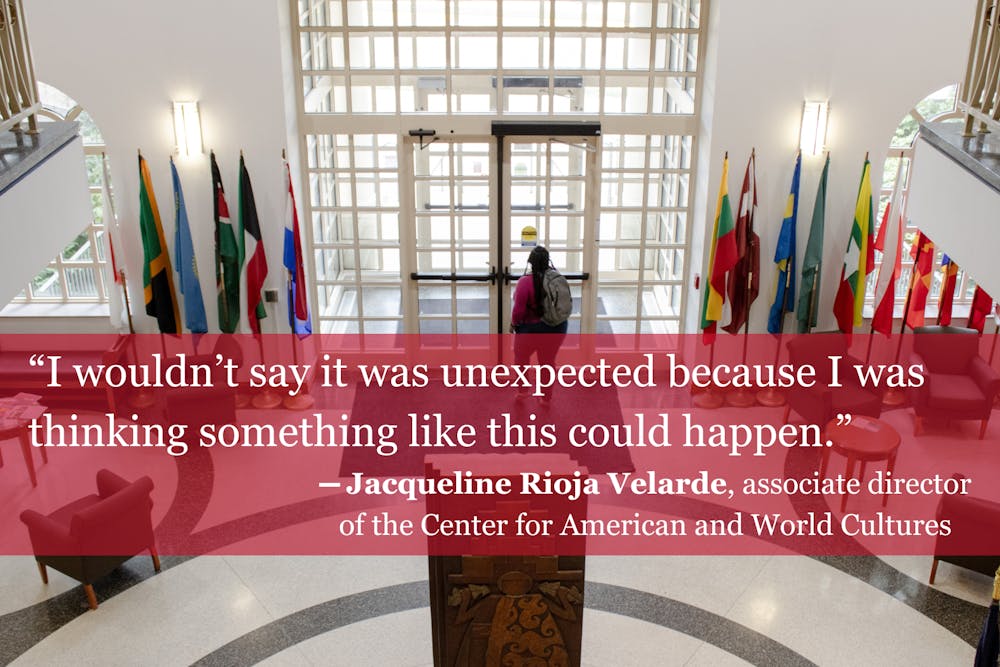Four Miami University departments under Academic Affairs will see reduced staffing at the start of the spring 2024 semester as the university navigates budgetary challenges.
In an email to The Miami Student, Miami’s Provost Elizabeth Mullenix confirmed Miami Online, the Office of Exploratory Studies, the American Culture and English Program (ACE) and the Center for American and World Cultures (CAWC) would see reduced staffing.
“With the many challenges facing higher education, including fewer students attending college at the national level and within the state, Miami University continues to review our operations so that we can consolidate services across our campuses, facilitate reorganization, redeploy resources to emerging areas, and address reasons of efficiency due to budgetary challenges,” Mullenix wrote. “These changes are expected to enhance our overall organizational effectiveness and better support our students.”
Across the four departments, 13 staff members were laid off, with their contracts ending Dec. 31.
Jacqueline Rioja Velarde, the associate director of the CAWC, has worked at Miami for 20 years, 17 of those years with the center. She was notified in July that she had been laid off.
“I wouldn’t say it was unexpected because I was thinking something like this could happen,” Rioja Velarde said. “I never thought they were going to eliminate the center though.”
The CAWC, which has a staff of three employees, provides academic programming across academic divisions in the university, partners with Student Affairs and the Center for Student Diversity and Inclusion (CSDI) and hosts the annual UniDiversity Festival each year. The center does not provide revenue to the university but rather promotes engagement through programs and initiatives.
“It is not an isolated program. It really integrated initiatives from all over campus,” Rioja Velarde said. “We have the curriculum guide that we designed every year, it included all the events and initiatives not only from Miami, but also other programs from the community at large.”
Over the past 20 years, Rioja Velarde said the center increased the number of Latinx individuals in the Oxford area and supported the admissions office to recruit Latinx students. It also helped guide the emergence of the Latin American and Caribbean Studies, which is now the Department of Global and Intercultural Studies, and assisted the Spanish and Portuguese Departments.
“I’m sure it wasn’t easy for the university and Provost’s Office to eliminate the center,” Rioja Velarde said, noting Mullenix's personal involvement and support to the UniDiversity Festival in years past.
Although Rioja Velarde said she’s not sure who will take over the festival after the center is eliminated next semester. She is focusing on preparing for this year’s event which takes place on Sept. 22 in Oxford Uptown Park. This year marks the 20th anniversary for the festival, which celebrates the contributions of Latin American, Latino and Caribbean people and cultures.
The center also houses the Global Readiness Certificate (GRC), an academic credential started by Alicia Castillo Shrestha.
Enjoy what you're reading?
Signup for our newsletter
Students from all majors can sign up to take the GRC, which combines university coursework, co-curricular activities and community involvement, all focused on global and intercultural communication. The certificate prepares students for employment in a competitive, diverse workforce.
“[The certificate] encourages you to study abroad, they offer a lot of different resources for financial aid, and help you find programs to fit your major and your interests,” Marisa Kelley, a senior journalism and social justice studies major, said.
Kelley joined the program her first year at Miami because she was intrigued with studying abroad, learning about different cultures and meeting people with similar interests.
Kelley received an email from Castillo Shrestha the week before the fall semester started informing her that the center would be eliminated.
“The university didn’t tell us, it was Alicia who told us, and that’s why it was kind of such a shock,” Kelley said.
Castillo Shrestha, who was also notified in July that she was laid off, said the students enrolled in the course now will finish the credential, but she is unsure how the program will look moving forward in Global Initiatives.
Kelley said Karla Guinigundo, the director of global partnerships in Global Initiatives, will be the new advisor overseeing the program.
“Thankfully we've got great partners who have stepped in to help because they believe in what we're doing,” Castillo Shrestha said.
Employees from Miami Online, Office of Exploratory Studies and ACE were reached out to but declined to comment or were not impacted by the layoffs.
Rioja Velarde said the decision to cut the center and reduce staffing within other departments at the university fall under a larger umbrella: higher education in state and federal legislature.
“It’s really political, and higher education institutions are facing unprecedented challenges in terms of long-term impactful decision-making processes,” Rioja Velarde said.
She cited the U.S. Supreme Court’s recent decision on affirmative action and the state’s Senate Bill 83, both of which work to diminish diversity, equity and inclusion efforts at universities, which is the antithesis of CAWC’s mission.
“Finances play a role, but priorities also,” Rioja Velarde said. “And priorities change with every administration I guess, and as a public institution there are a lot of pressures and stress influenced by S.B. 83.”
Kelley said the elimination of the center makes her believe that the university thinks S.B. 83 will pass in the House as hearings begin soon.
Although she doesn’t know how DEI initiatives will look as the center is eliminated and politics become increasingly targeted toward higher education, she is confident in the work of Global Initiatives and the Office of Institutional Diversity and Inclusion to carry out the university’s commitment to creating an equitable environment.
“The culture is influencing the way that diversity, equity and inclusion are approached and embraced, and this is really concerning,” Rioja Velarde said.




